Curious Kids: how do magpies detect worms and other food underground?
- Written by Gisela Kaplan, Emeritus Professor in Animal Behaviour, University of New England
How do magpies detect worms and other food sources underground? I often see them look or listen, then rapidly hop across the ground and start digging with their beak and extract a worm or bug from the earth – Catherine, age 10, Perth.
You have posed a very good question.
Foraging for food can involve sight, hearing and even smell. In almost all cases learning is involved. Magpies are ground foragers, setting one foot before the other looking for food while walking, called walk-foraging. It looks like this:
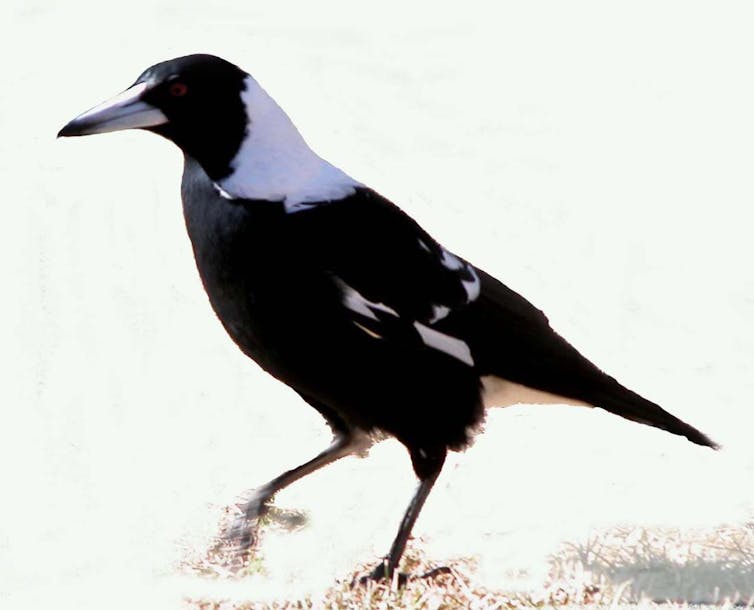 This is called walk-foraging.
Gisela Kaplan, Author provided
This is called walk-foraging.
Gisela Kaplan, Author provided
Finding food on the ground, such as beetles and other insects, is not as easy as it may sound. The ground can be uneven and covered with leaves, grasses and rocks. Insects may be hiding, camouflaged, or staying so still it is hard for a magpie to notice them.
Read more: Curious Kids: why is a magpie's poo black and white?
Detecting a small object on the ground requires keen vision and experience, to discriminate between the parts that are important and those that are not.
Magpie eyes, as for most birds, are on the side of the head (humans and other birds of prey, by contrast, have eyes that face forward).
 A magpie’s eyes are at the side of its head and it can only see something with both eyes if that is straight in front of the bird.
Shutterstock/Webb Photography
A magpie’s eyes are at the side of its head and it can only see something with both eyes if that is straight in front of the bird.
Shutterstock/Webb Photography
To see a small area in front of them, close to the ground, birds use both eyes together (scientists call this binocular vision). But birds mostly see via the eyes looking out to the side (which is called monocular vision).
This picture gives you an idea of what a magpie can see with its left eye, what it can see with its right eye and what area it can see with both eyes working together (binocular vision).
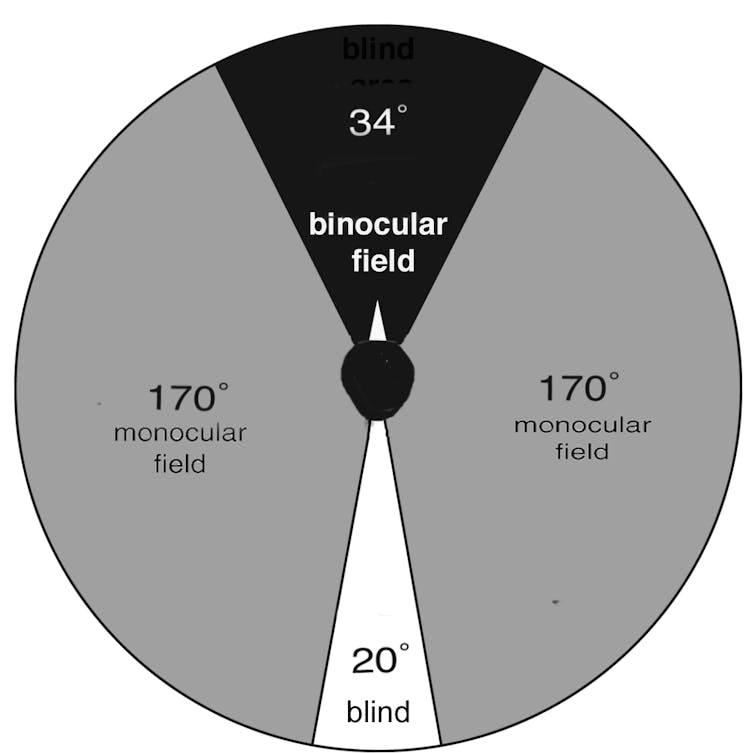 Here’s how a magpie’s field of vision works.
Gisela Kaplan, Author provided
Here’s how a magpie’s field of vision works.
Gisela Kaplan, Author provided
You asked about underground foraging. Some of that foraging can also be done by sight. Worms, for instance, may leave a small mound (called a cast) on the surface and, to the experienced bird, this indicates that a worm is just below.
Magpies can also go a huge step further. They can identify big scarab larvae underground without any visual help at all.
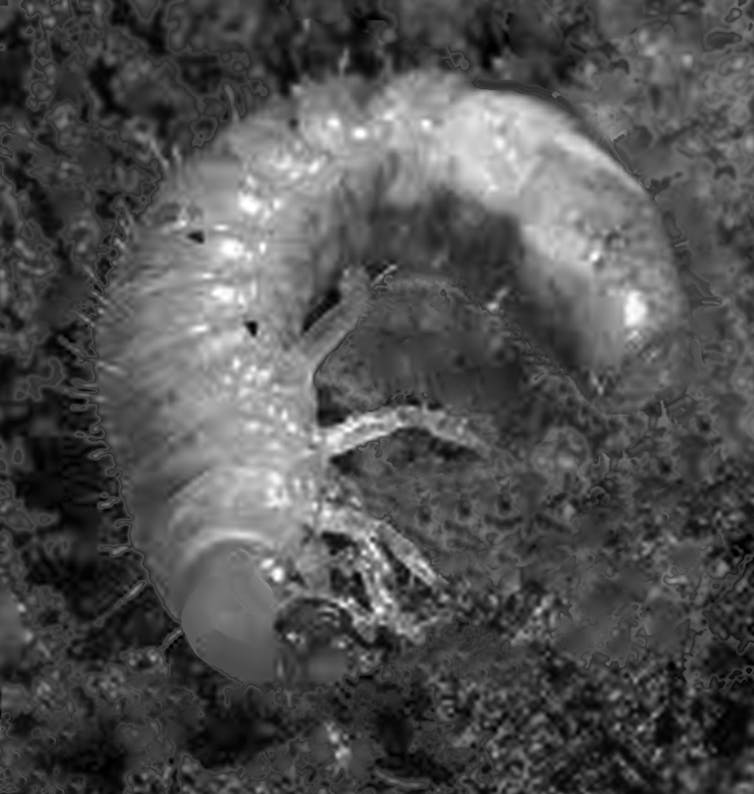 Here is a scarab larva.
Gisela Kaplan, Author provided
Here is a scarab larva.
Gisela Kaplan, Author provided
Scarab larvae look like grubs. They munch on grassroots and can kill entire grazing fields. Once they transform into beetles (commonly called Christmas beetles) they can do even more damage by eating all the leaves off eucalyptus trees.
Here is the secret: magpies have such good hearing, they can hear the very faint sound of grass roots being chewed.
We know this from experiments using small speakers under the soil playing back recorded sounds of scarab beetle larvae. Magpies located the speaker every time and dug it up.
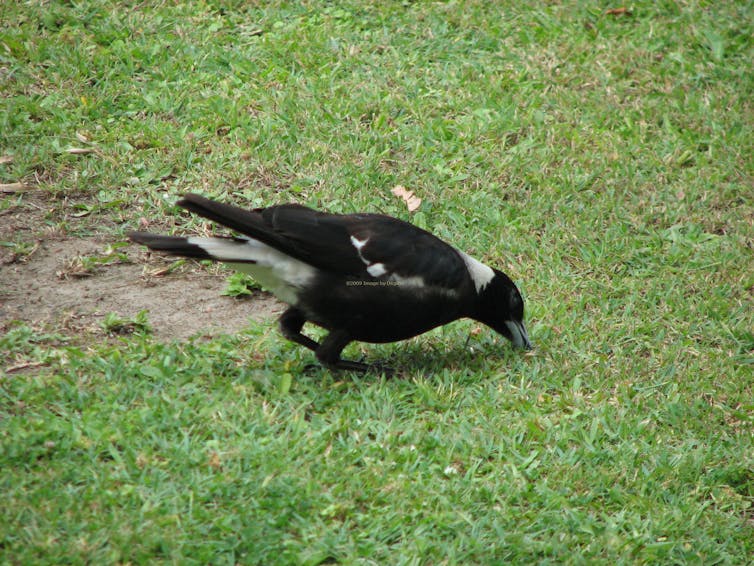 An Australian magpie digging for food in a lawn.
Flickr/Lance, CC BY-NC-ND
An Australian magpie digging for food in a lawn.
Flickr/Lance, CC BY-NC-ND
So how do they do it? Several movements are involved.
To make certain that a jab with its beak will hit the exact spot where the juicy grub is, the magpie first walks slowly and scans the ground. It then stops and looks closely at the ground – seemingly with both eyes working together.
Then, holding absolutely still, the magpie turns its head so the left side of the head and ear is close to the ground for a final confirming listen.
Finally, the bird straightens up, then executes a powerful jab into the ground before retrieving the grub.
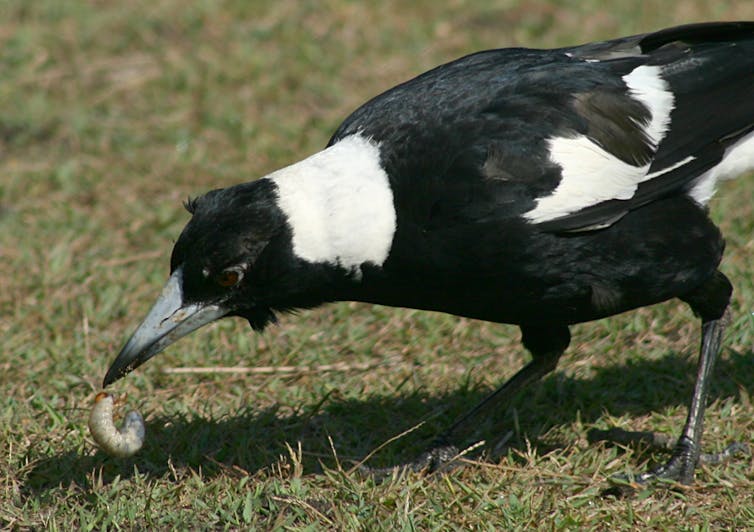 An Australian magpie digging for food gets a grub.
Wikimedia/Toby Hudson, CC BY-SA
An Australian magpie digging for food gets a grub.
Wikimedia/Toby Hudson, CC BY-SA
That is very clever of the magpies. Very few animals can extract food they can’t see. Only great apes and humans were thought to have this ability. Clever magpies indeed. And farmers love them for keeping a major pest under control.
Read more: Curious Kids: Why do birds sing?
Hello, curious kids! Have you got a question you’d like an expert to answer? Ask an adult to send your question to curiouskids@theconversation.edu.au
Authors: Gisela Kaplan, Emeritus Professor in Animal Behaviour, University of New England






